Unit 4 Never too old to learn:Reading (I)课件(共26张) -2024-2025学年高中《英语》 选择性必修 第四册(译林版)
文档属性
| 名称 | Unit 4 Never too old to learn:Reading (I)课件(共26张) -2024-2025学年高中《英语》 选择性必修 第四册(译林版) |
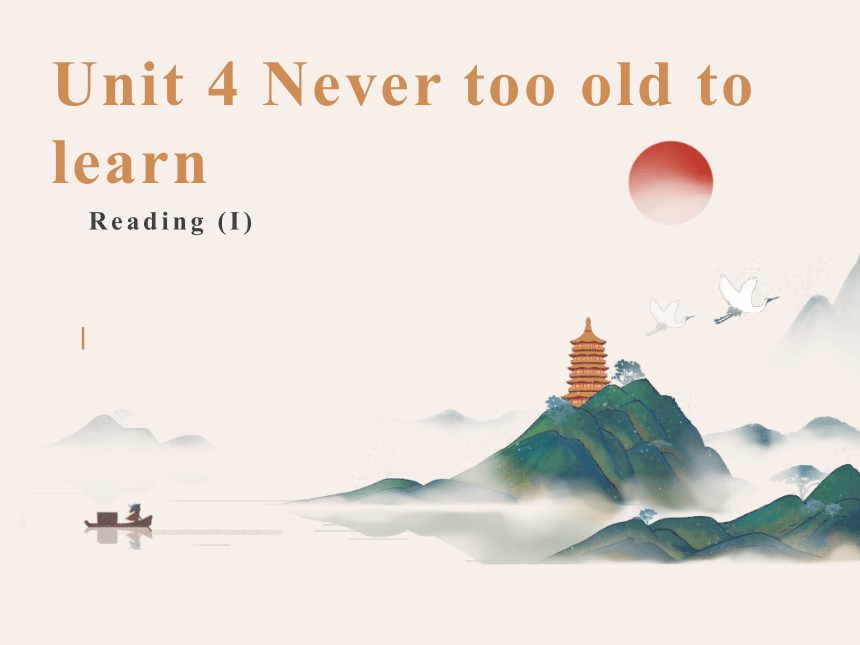
|
|
| 格式 | pptx | ||
| 文件大小 | 3.3MB | ||
| 资源类型 | 教案 | ||
| 版本资源 | 牛津译林版(2019) | ||
| 科目 | 英语 | ||
| 更新时间 | 2025-01-14 16:03:21 | ||
图片预览

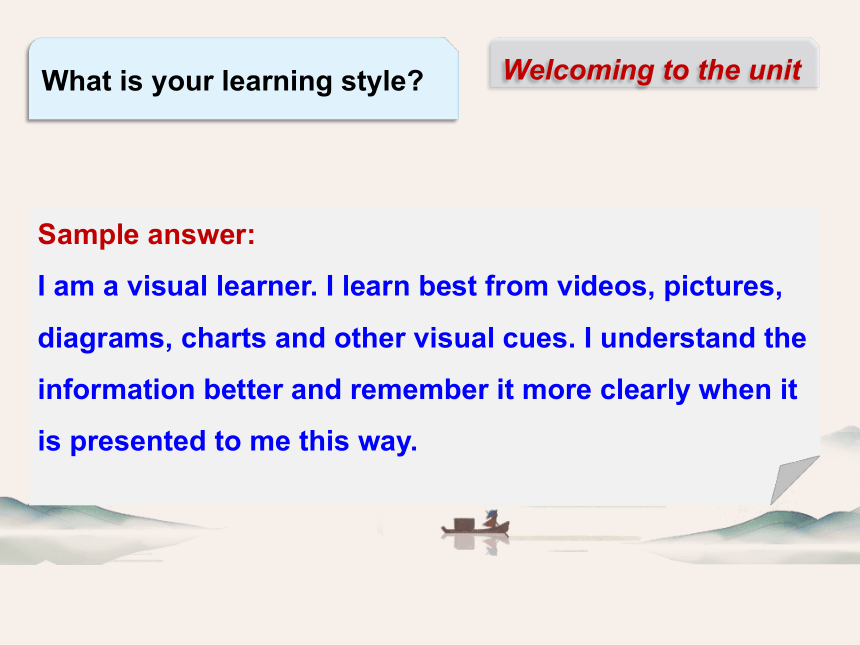
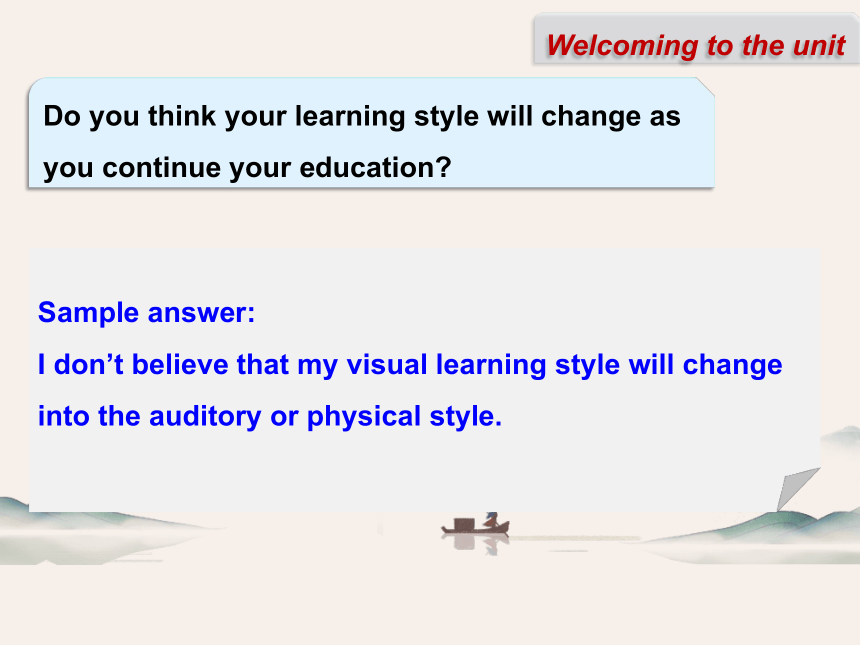
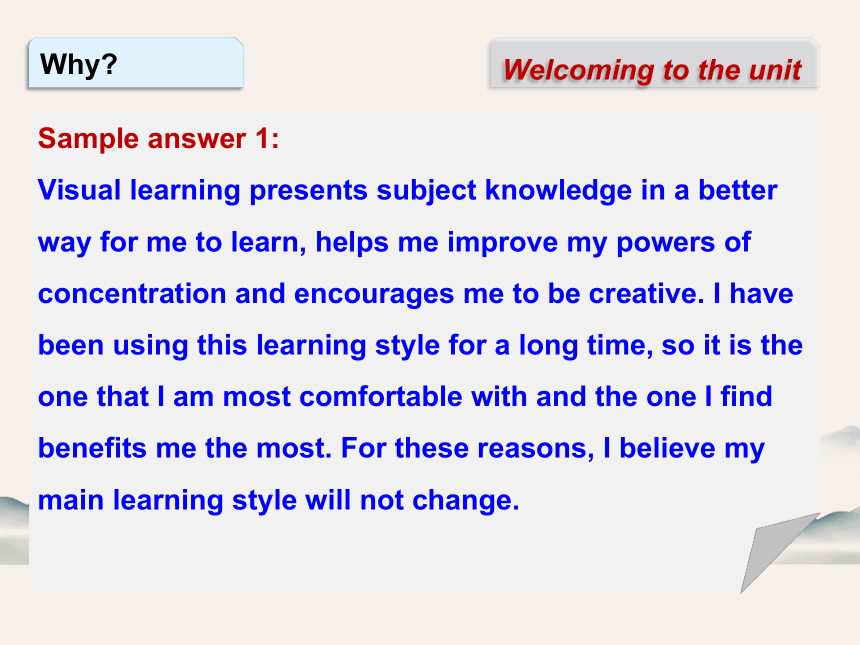
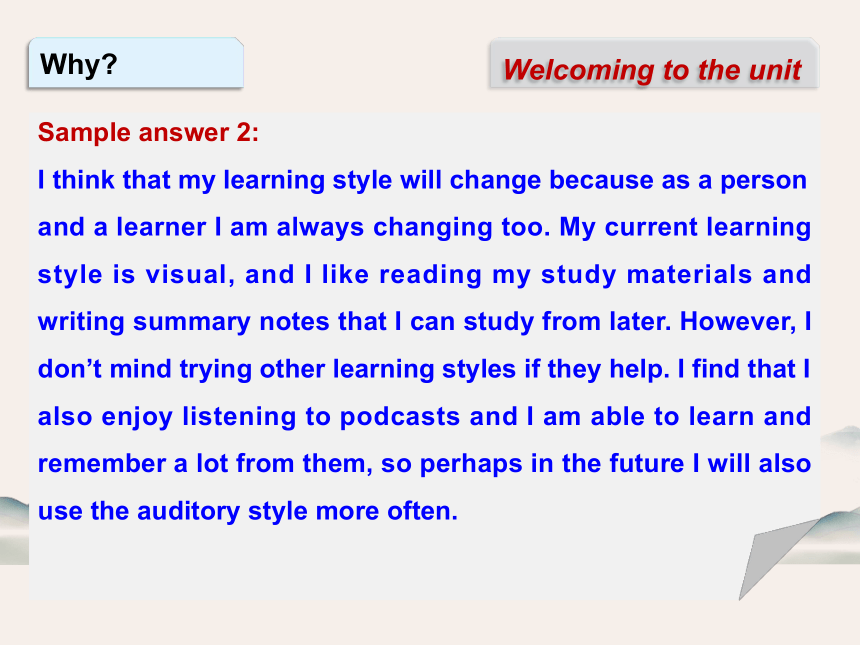
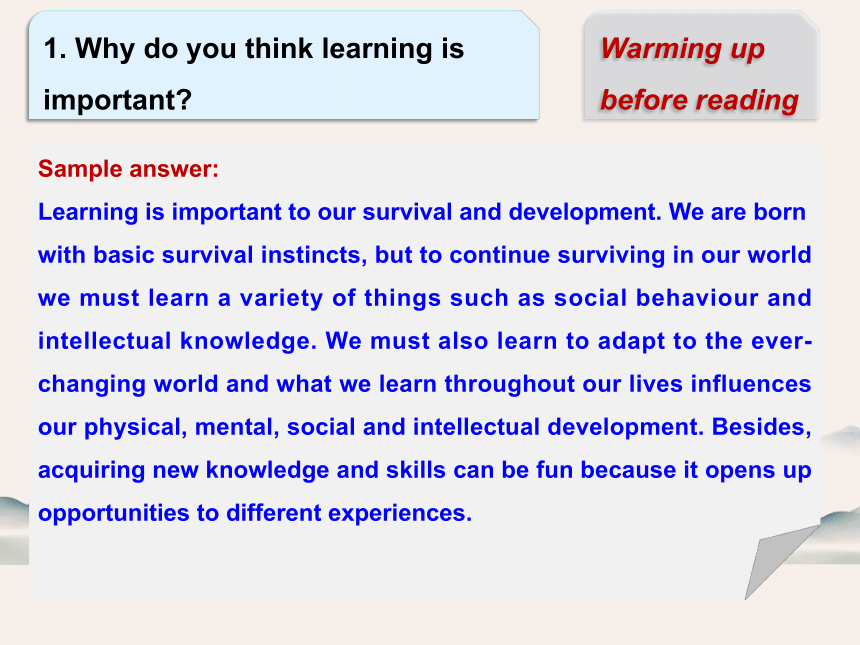
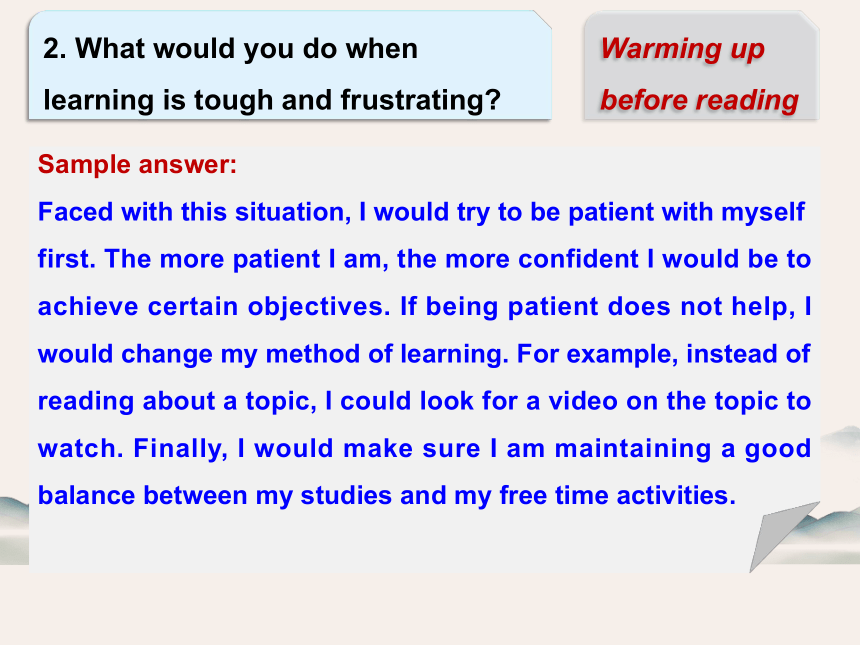
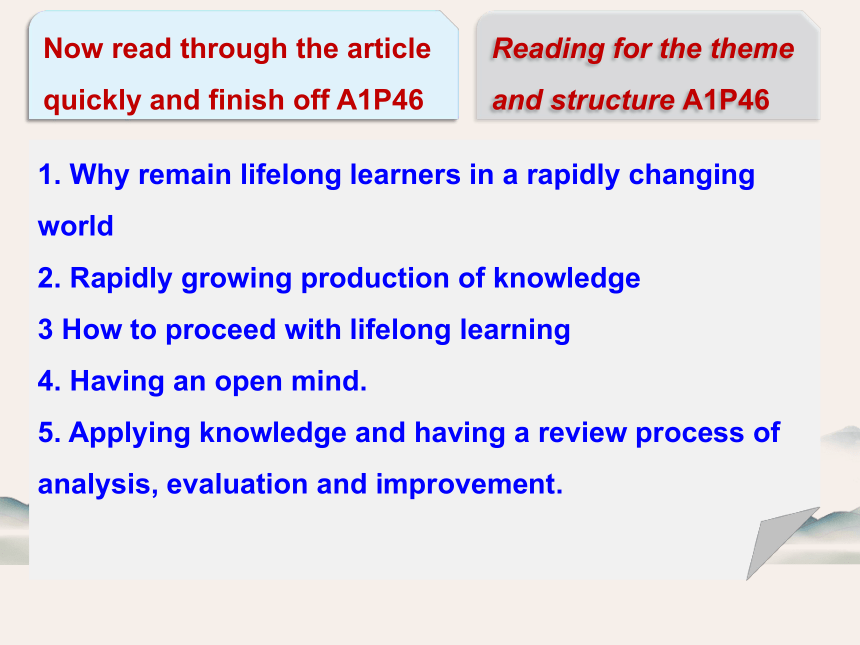
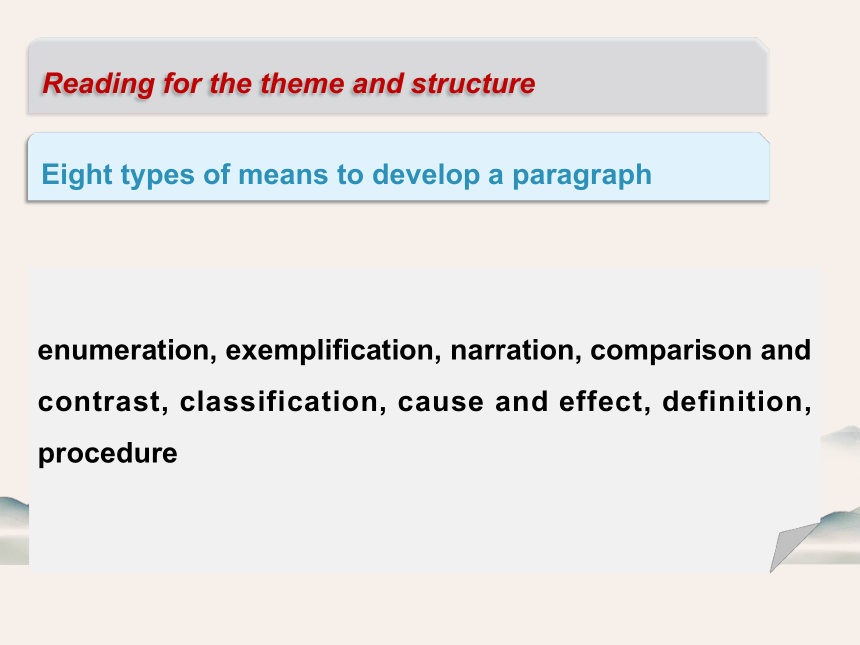
文档简介
(共26张PPT)
Reading (I)
Unit 4 Never too old to learn
What is your learning style
Welcoming to the unit
Sample answer:
I am a visual learner. I learn best from videos, pictures, diagrams, charts and other visual cues. I understand the information better and remember it more clearly when it is presented to me this way.
Do you think your learning style will change as you continue your education
Welcoming to the unit
Sample answer:
I don’t believe that my visual learning style will change into the auditory or physical style.
Why
Welcoming to the unit
Sample answer 1:
Visual learning presents subject knowledge in a better way for me to learn, helps me improve my powers of concentration and encourages me to be creative. I have been using this learning style for a long time, so it is the one that I am most comfortable with and the one I find benefits me the most. For these reasons, I believe my main learning style will not change.
Why
Welcoming to the unit
Sample answer 2:
I think that my learning style will change because as a person and a learner I am always changing too. My current learning style is visual, and I like reading my study materials and writing summary notes that I can study from later. However, I don’t mind trying other learning styles if they help. I find that I also enjoy listening to podcasts and I am able to learn and remember a lot from them, so perhaps in the future I will also use the auditory style more often.
1. Why do you think learning is important
Warming up before reading
Sample answer:
Learning is important to our survival and development. We are born with basic survival instincts, but to continue surviving in our world we must learn a variety of things such as social behaviour and intellectual knowledge. We must also learn to adapt to the ever-changing world and what we learn throughout our lives influences our physical, mental, social and intellectual development. Besides, acquiring new knowledge and skills can be fun because it opens up opportunities to different experiences.
2. What would you do when learning is tough and frustrating
Warming up before reading
Sample answer:
Faced with this situation, I would try to be patient with myself first. The more patient I am, the more confident I would be to achieve certain objectives. If being patient does not help, I would change my method of learning. For example, instead of reading about a topic, I could look for a video on the topic to watch. Finally, I would make sure I am maintaining a good balance between my studies and my free time activities.
Now read through the article quickly and finish off A1P46
Reading for the theme and structure A1P46
1. Why remain lifelong learners in a rapidly changing world
2. Rapidly growing production of knowledge
3 How to proceed with lifelong learning
4. Having an open mind.
5. Applying knowledge and having a review process of analysis, evaluation and improvement.
Reading for the theme and structure
enumeration, exemplification, narration, comparison and contrast, classification, cause and effect, definition, procedure
Eight types of means to develop a paragraph
Reading for the theme and structure
Paragraph Development Reference
Para. 1
Para. 2
Para. 3
Para. 4
exemplification
选必4U3L5
cause and effect
选必4U3L2
procedure
选必4U4L1
enumeration
选必4U3L5
Reading for the detailed information A2P46
2. What will you be exposed to as you progress through life
________________________________________________
2. You will be exposed to many new ideas, practices and learning experiences.
Reading for the detailed information A2P46
4. How can we take advantage of opportunities for lifelong learning
________________________________________________
4. We must follow it up with a review process of analysis, evaluation and improvement.
Reading for the detailed information
What quality should a life-long learner possess according to the text
Being critical.
B. Being subjective.
C. Being kind-hearted.
D. Being open-minded.
Check your progress
Reading for inference A2P46
1. What does “this” in line 5 mean
________________________________________________
1. It means acquiring knowledge is a way of appreciating how much, as an individual, you don’t know.
Reading for inference A2P46
3. Why are critical thinking skills important according to the author
________________________________________________
3. They prevent you from blindly accepting new ideas.
Reading for inference
1. What does “this” mean in the last sentence of Para. 2
A. That you have to remain a life-long learner.
B. That there exist too much of knowledge in the world.
C. That you’ll do new jobs, apply new technologies and resolve new problems.
D. That it’s difficult to keep pace with development of society.
Check your progress
Reading for inference
2. Why is the art teacher mentioned in Para. 1
A. To help readers to see what can’t be seen.
B. To prove the teacher is great.
C. To exhibit the attraction of art.
D. To ask readers to appreciate their ignorance.
Check your progress
Discussion A3P46
The author mentions an example of drawing a still life and a quote from Confucius in the opening paragraph of the magazine article. Why do you think the author uses the example and the quote How do you understand them
Discussion A3P46
The author uses the example and the quote to prove that it is important to recognize what we do not know and that by doing this, we can learn more. The author uses the example to illustrate that when we are learning, we should not only pay attention to what we already know, but also to what we do not know. Following that example, the quote seems to define “knowledge” differently. We usually consider knowledge as what we already know, but recognizing that we do not know is also knowledge.
Discussion A3P46
It is said that people usually experience four stages of learning: not knowing that they do not know, knowing that they do not know, knowing that they know, and not knowing that they know. How do you understand this
Discussion A3P46
I agree, because it describes the logical order of our learning.
1) “Not knowing that they do not know”
People do not know they lack some knowledge, for they have never encountered it before, for example, as young children, or when experiencing another culture for the first time.
Discussion A3P46
2) “Knowing that they do not know”
People know they are ignorant of some knowledge that they know exists but have not yet learnt for various reasons: it is not necessary for people to learn it, or they are in the process of learning it.
Discussion A3P46
3) “Knowing that they know”
People know they have acquired the knowledge and it is knowledge they use regularly.
Discussion A3P46
4) “Not knowing that they know”
People do not know they have knowledge that they have probably encountered before, or perhaps it is knowledge they do not use it often enough.
Homework
1. Watch the micro lesson: How to write excellent procedural texts.
2. Finish off AP75 in the workbook. (Optional)
Answers:
1) resolved 2) qualify 3) essay 4) presentation 5) to inquire 6) concrete 7) is criticized 8) certificate
感谢观看
Reading (I)
Unit 4 Never too old to learn
What is your learning style
Welcoming to the unit
Sample answer:
I am a visual learner. I learn best from videos, pictures, diagrams, charts and other visual cues. I understand the information better and remember it more clearly when it is presented to me this way.
Do you think your learning style will change as you continue your education
Welcoming to the unit
Sample answer:
I don’t believe that my visual learning style will change into the auditory or physical style.
Why
Welcoming to the unit
Sample answer 1:
Visual learning presents subject knowledge in a better way for me to learn, helps me improve my powers of concentration and encourages me to be creative. I have been using this learning style for a long time, so it is the one that I am most comfortable with and the one I find benefits me the most. For these reasons, I believe my main learning style will not change.
Why
Welcoming to the unit
Sample answer 2:
I think that my learning style will change because as a person and a learner I am always changing too. My current learning style is visual, and I like reading my study materials and writing summary notes that I can study from later. However, I don’t mind trying other learning styles if they help. I find that I also enjoy listening to podcasts and I am able to learn and remember a lot from them, so perhaps in the future I will also use the auditory style more often.
1. Why do you think learning is important
Warming up before reading
Sample answer:
Learning is important to our survival and development. We are born with basic survival instincts, but to continue surviving in our world we must learn a variety of things such as social behaviour and intellectual knowledge. We must also learn to adapt to the ever-changing world and what we learn throughout our lives influences our physical, mental, social and intellectual development. Besides, acquiring new knowledge and skills can be fun because it opens up opportunities to different experiences.
2. What would you do when learning is tough and frustrating
Warming up before reading
Sample answer:
Faced with this situation, I would try to be patient with myself first. The more patient I am, the more confident I would be to achieve certain objectives. If being patient does not help, I would change my method of learning. For example, instead of reading about a topic, I could look for a video on the topic to watch. Finally, I would make sure I am maintaining a good balance between my studies and my free time activities.
Now read through the article quickly and finish off A1P46
Reading for the theme and structure A1P46
1. Why remain lifelong learners in a rapidly changing world
2. Rapidly growing production of knowledge
3 How to proceed with lifelong learning
4. Having an open mind.
5. Applying knowledge and having a review process of analysis, evaluation and improvement.
Reading for the theme and structure
enumeration, exemplification, narration, comparison and contrast, classification, cause and effect, definition, procedure
Eight types of means to develop a paragraph
Reading for the theme and structure
Paragraph Development Reference
Para. 1
Para. 2
Para. 3
Para. 4
exemplification
选必4U3L5
cause and effect
选必4U3L2
procedure
选必4U4L1
enumeration
选必4U3L5
Reading for the detailed information A2P46
2. What will you be exposed to as you progress through life
________________________________________________
2. You will be exposed to many new ideas, practices and learning experiences.
Reading for the detailed information A2P46
4. How can we take advantage of opportunities for lifelong learning
________________________________________________
4. We must follow it up with a review process of analysis, evaluation and improvement.
Reading for the detailed information
What quality should a life-long learner possess according to the text
Being critical.
B. Being subjective.
C. Being kind-hearted.
D. Being open-minded.
Check your progress
Reading for inference A2P46
1. What does “this” in line 5 mean
________________________________________________
1. It means acquiring knowledge is a way of appreciating how much, as an individual, you don’t know.
Reading for inference A2P46
3. Why are critical thinking skills important according to the author
________________________________________________
3. They prevent you from blindly accepting new ideas.
Reading for inference
1. What does “this” mean in the last sentence of Para. 2
A. That you have to remain a life-long learner.
B. That there exist too much of knowledge in the world.
C. That you’ll do new jobs, apply new technologies and resolve new problems.
D. That it’s difficult to keep pace with development of society.
Check your progress
Reading for inference
2. Why is the art teacher mentioned in Para. 1
A. To help readers to see what can’t be seen.
B. To prove the teacher is great.
C. To exhibit the attraction of art.
D. To ask readers to appreciate their ignorance.
Check your progress
Discussion A3P46
The author mentions an example of drawing a still life and a quote from Confucius in the opening paragraph of the magazine article. Why do you think the author uses the example and the quote How do you understand them
Discussion A3P46
The author uses the example and the quote to prove that it is important to recognize what we do not know and that by doing this, we can learn more. The author uses the example to illustrate that when we are learning, we should not only pay attention to what we already know, but also to what we do not know. Following that example, the quote seems to define “knowledge” differently. We usually consider knowledge as what we already know, but recognizing that we do not know is also knowledge.
Discussion A3P46
It is said that people usually experience four stages of learning: not knowing that they do not know, knowing that they do not know, knowing that they know, and not knowing that they know. How do you understand this
Discussion A3P46
I agree, because it describes the logical order of our learning.
1) “Not knowing that they do not know”
People do not know they lack some knowledge, for they have never encountered it before, for example, as young children, or when experiencing another culture for the first time.
Discussion A3P46
2) “Knowing that they do not know”
People know they are ignorant of some knowledge that they know exists but have not yet learnt for various reasons: it is not necessary for people to learn it, or they are in the process of learning it.
Discussion A3P46
3) “Knowing that they know”
People know they have acquired the knowledge and it is knowledge they use regularly.
Discussion A3P46
4) “Not knowing that they know”
People do not know they have knowledge that they have probably encountered before, or perhaps it is knowledge they do not use it often enough.
Homework
1. Watch the micro lesson: How to write excellent procedural texts.
2. Finish off AP75 in the workbook. (Optional)
Answers:
1) resolved 2) qualify 3) essay 4) presentation 5) to inquire 6) concrete 7) is criticized 8) certificate
感谢观看
同课章节目录
